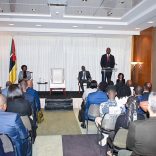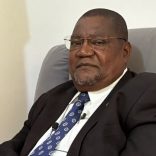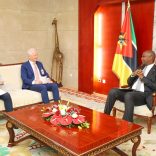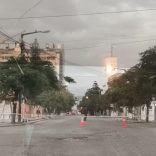President hails Samora legacy at Mozambican community event in Switzerland
Mozambique: Ex-Renamo fighters announce management committee to call party congress and elect new president

The 'National Conference of Renamo Demobilized Fighters' took place in Chimoio, Manica province. [Photo: Integrity]
A group of former guerrillas from the Mozambican National Resistance (Renamo) has formed a party management committee, rejecting the leadership of Ossufo Momade, and has pledged to hold an electoral Congress — decisions not recognised by the current party leadership.
“The committee will last as long as it needs to; it has no end. It only has a beginning — and this is it. It will only end when we put in place the conditions for the party Congress to be held,” said Edgar Silva, spokesperson for the group, made up of dozens of demobilised Renamo guerrillas who met on Saturday and Sunday in Chimoio, Manica province, central Mozambique, at a ‘National Conference of Renamo Demobilised Fighters’.
Silva explained that the management committee, of which he is a member, is composed of three representatives — one from each of Mozambique’s northern, central and southern regions.
“We will create the conditions for a National Council to be held and set a date for an Extraordinary Congress, where we intend to legitimise a president through a vote — a president who will lead the destiny of this party,” Silva added.
He also criticised Ossufo Momade’s leadership, accusing him of “cronyism, nepotism and arrogance”.
Contacted by Lusa, Renamo spokesperson Marcial Macome said the party is “unaware” of any decision relating to this self-proclaimed committee and “distances itself from any statement” by the group of former guerrillas, who have in recent months challenged Momade’s leadership — including forcibly closing several party offices and delegations.
“We don’t know who this management committee is, what legitimacy it has, or even what they intend to manage,” said Macome, adding that the demobilised Renamo members already have their own structure — the Association of Fighters in the Struggle for Democracy (ACOLDE) — which has no connection to this group. Marcial Macome stressed that the party continues to operate with its “recognised structures”.
Macome confirmed that Renamo’s Political Commission will meet on Thursday, 2 October, and that only afterwards will the party decide on the timing of the next National Council — one of the key demands of the dissident group.
READ: Mozambique: Renamo denies report that Momade has been given a sinecure
Renamo lost its position as the second-largest political force in the general elections of 9 October 2024, falling from 60 parliamentary seats in 2019 to just 28. Since then, opposition to Momade’s leadership has intensified, with former guerrillas shutting down party branches and calling for a National Council — actions that have prompted police intervention, including at the party’s national headquarters in Maputo, where more than 50 people were arrested.
The party had previously announced it would hold its first National Council of 2025 on 7–8 March — it is statutorily required to hold two per year — but this was postponed without a new date. The leadership has acknowledged the requirement to hold two councils per year but claims they are not necessarily required to occur in separate semesters.
Momade, who has faced growing calls to resign, is also accused of alleged mismanagement, failure to pay pensions and benefits, and “total incompetence” in handling the party’s ongoing crisis.
He assumed the Renamo presidency in January 2019, following the death of long-time leader Afonso Dhlakama (1953–2018), and was re-elected in May 2024 — a process that was heavily contested within the party.
Momade stood as Renamo’s presidential candidate in the 2024 general elections, securing just 6% of the vote — the worst result for a candidate backed by the party, which has been the main opposition force in Mozambique since the first multiparty elections in 1994.
Mozambique endured a 16-year civil war between the government and Renamo, which ended with the signing of the General Peace Agreement in Rome in 1992. The accord, signed by then-president Joaquim Chissano and Afonso Dhlakama, paved the way for the country’s first democratic elections two years later.












Leave a Reply
Be the First to Comment!
You must be logged in to post a comment.
You must be logged in to post a comment.